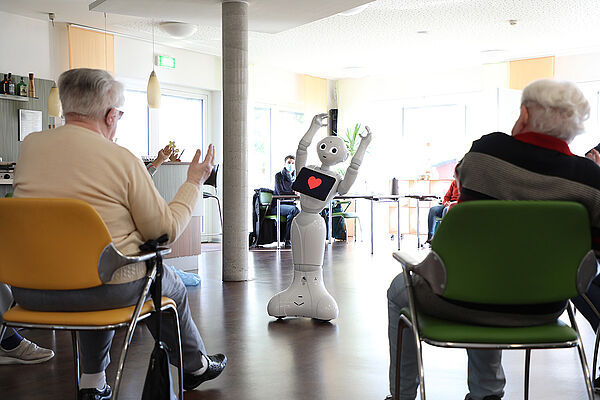Novel technologies assisting people with dementia
Use of the social robot “Pepper” in a care facility

In Europe, about 10 million people are living with dementia and this is expected to double by 2050. Most people affected by this condition want to stay in their own homes and maintain their independence and autonomy as long as possible and, if needed, with support of family and/or professional caregivers. The health care, industry and social sectors are urgently struggling with the question of how to support people with dementia and carers effectively as well as how and what kind of technology can help with this, even when a person with dementia has to live in a nursing home. This may involve modern technologies such as human-like robots. The DZNE investigates this kind of approaches within the context of the EU-funded DISTINCT project.
The main aim of DISTINCT is to develop a premier quality multi-disciplinary, multi-professional and intersectorial education and training research framework for Europe. The project will train and qualify 15 doctoral students of different nationalities to become experts in the health and social needs of people with dementia and the effective application of technological solutions to support them in the daily care routine.
Witten projects
At the DZNE’s Witten site, which in particular focuses on the nursing care of people with dementia, two doctoral students are involved in DISTINCT: Simone Felding from Denmark and Beliz Budak from Turkey. Both students are supervised by Prof. Martina Roes. Simone Felding focusses in her research on acceptance of social robots into everyday life for people with dementia living in nursing homes. Her longitudinal, ethnographic study will characterize the implementation processes from the perspective of the users. Beliz Budak investigates in her project the implementation of “ambient assisted living” (AAL) technology addressing communication-related issues of dementia such as loneliness in nursing homes. In a pilot study throughout Europe she will identify facilitators and barriers across care settings.
Visit to a nursing home
Recently, during a visit to a care facility (“Altenzentrum am Schwesternpark Feierabendhäuser” in Witten) the doctoral students and other staff members of DZNE Witten gained practical insights into the applications of human-like robots. Their visit happened on the occasion of a workshop that was organized by the German AAL Academy and involved a version of the social robot “Pepper”.
The DZNE’s DISTINCT team – Prof. Martina Roes, Simone Felding, Beliz Budak, Dr. Sonja Teupen, Franziska Laporte Uribe, Ph.D. and Viktoria Peters-Nehrenheim – had the opportunity to observe and experience the interactive use of Pepper. In three small groups (residents without cognitive impairment, people with symptoms of dementia and people with severe dementia), Manuela Söhnchen, head of social services, introduced the robot and carried out various activities with the residents. To welcome and greet the residents, Pepper was able to shake hands or hug. Under the active guidance of Pepper the head of social services and the residents exercised light gymnastics moves. A small quiz rounded off the interactive circle.
Afterwards the DZNE’s team had the opportunity to discuss the three sessions and different challenges regarding the implementation of robots in care facilities as well as possible ideas for improvements.
November 2020
